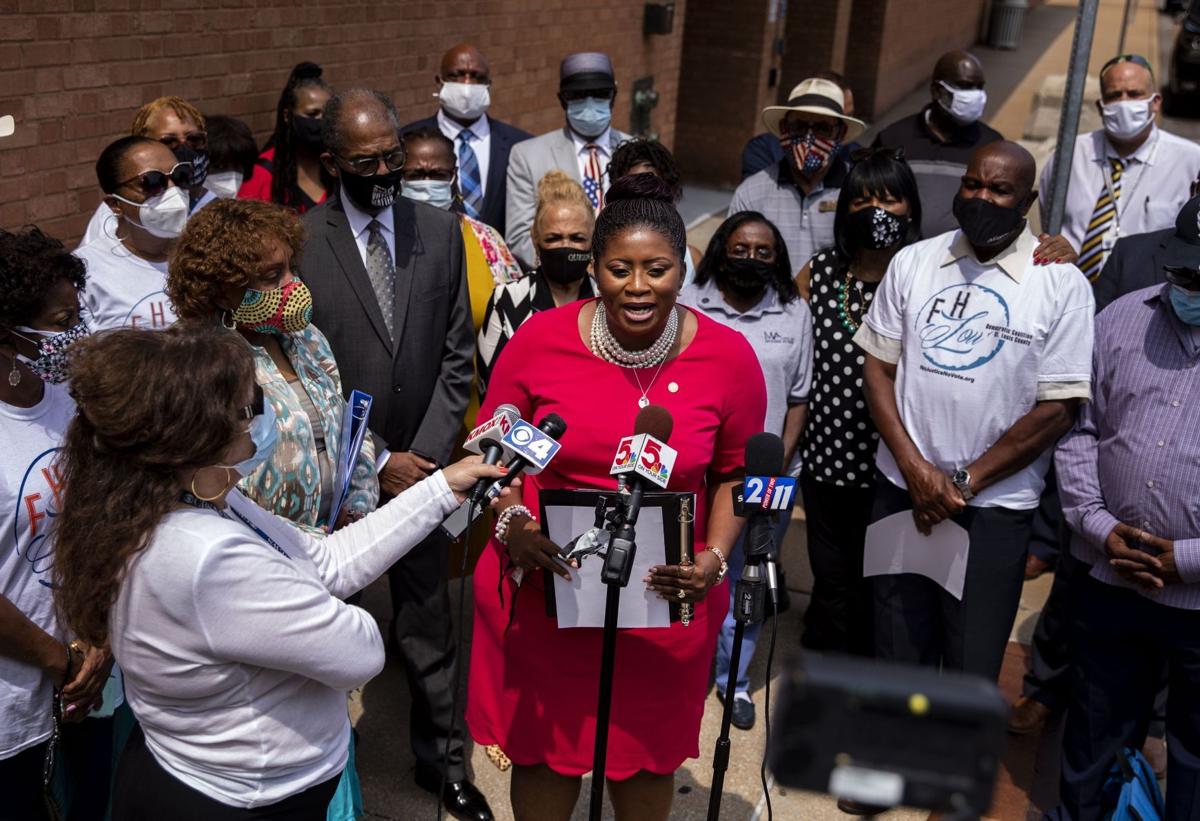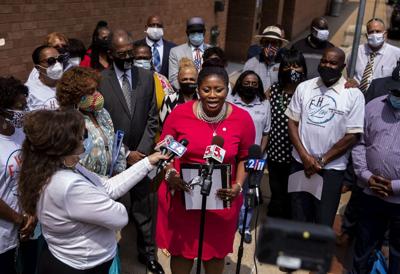CLAYTON ŌĆö The survey responses have been collected, the town halls held. Now, ├█č┐┤½├Į County officials will have to square public input with their own goals for spending more than $85 million in federal pandemic aid.
Councilman Ernie Trakas, R-6th District, has called for $30 million for projects and social services in his mostly unincorporated south ├█č┐┤½├Į County district.
Councilwomen Rita Days, D-1st District, and Shalonda Webb, D-4th District, are expected to press forward with a revised version of their earlier proposal to spend $50 million on public health-related investments in north ├█č┐┤½├Į County.
And Councilman Tim Fitch, R-3rd District, has sponsored bills granting police department requests for roughly $34 million.
The council also is considering leftover requests from County Executive Sam PageŌĆÖs 2021 budget plan, including $1.1 million for Prosecuting Attorney Wesley Bell to add nine attorneys and five other staffers, $1.2 million for online services for residents, and $270,000 for the public health department for services including protective gear and public transport to and from its three health centers.
People are also reading…
The proposals were put on hold late last year over council concerns about meeting federal funding rules, which the U.S. Treasury finalized in January, and for a planned community survey, which launched in late February. That survey closed March 25 with 3,281 responses ŌĆö a sliver of the countyŌĆÖs population of 997,187 ŌĆö with a few hundred coming from each of the seven council districts. Over the month, members of PageŌĆÖs cabinet and council members also heard from residents directly at in-person and online town halls.
Days said Thursday that she had asked for a council hearing on the survey results on April 19. County Chief of Staff Cal Harris said PageŌĆÖs office hopes to publish the survey results ŌĆ£within the month.ŌĆØ The county has until the end of the year to appropriate the funds.
Some community activists say the spending plans already before the council indicate county officials wonŌĆÖt seriously incorporate public input.
ŌĆ£After a great deal of time and effort we finally opened a survey to the public so they could state their preferences directly,ŌĆØ Chris Wilcox, a social worker with the North County nonprofit A Red Circle, told the council this week. ŌĆ£We can make assumptions about what residents want from this funding, but if this effort was not simply an exercise in box checking we would need to hear from their own words before committing the remaining funds.ŌĆØ
Kelly McGowan, with the community activist group , urged PageŌĆÖs office to consider holding more town halls or attending other community events to get feedback on the plans. Both Wilcox and McGowan had attended council meetings and town halls to track ARPA discussions and walked door to door to ask residents to fill out the survey.
ŌĆ£├█č┐┤½├Į County, itŌĆÖs now your turn,ŌĆØ McGowan said. ŌĆ£You need to be intentional and transparent.ŌĆØ
Two other public speakers at TuesdayŌĆÖs meeting urged the council to adopt TrakasŌĆÖ bill, which he revised at the meeting to scale back a proposal he made in November, originally calling for $62.5 million for the district.
ŌĆ£All I ask is that District 6 receive our fair share,ŌĆØ said Patrick Finn, a resident of the unincorporated Oakville area.
Trakas has argued most residents in the other six council districts have many of their government services met by municipalities that received their own allotments of federal aid.
The countyŌĆÖs 88 municipalities have been allocated a total of about $127 million in ARPA funds, up from nearly $47 million they received in 2020 from the countyŌĆÖs $173.5 million in emergency pandemic aid.
ŌĆ£For far too long, unincorporated ├█č┐┤½├Į County has been the redheaded stepchild of the county, with residents paying their share of taxes and not getting their due,ŌĆØ Trakas said Tuesday.
Trakas said his bill incorporates input heŌĆÖs received from South County residents, including at a recent ARPA town hall. It includes $15 million to address problem properties and infrastructure repair, $12.5 million for aid to businesses, $2.4 million for mental health support, child care and housing aid, and $2.5 million to create a substance abuse treatment center at the countyŌĆÖs South County public health center in Sunset Hills.
Webb, whose North County district includes the second largest portion of unincorporated neighborhoods, said she understood TrakasŌĆÖ ŌĆ£frustrationsŌĆØ and supported parts of his plan.
Her August proposal for $50 million for North County ŌĆö which had called for two new public health centers, two mobile COVID-19 vaccination and health clinics and funding for a door-to-door public health campaign ŌĆö is meant to address disparities between the Black-majority area and whiter, more affluent parts of the county. But it was on hold until the survey results came in, she said.
Residents were already ŌĆ£very skeptical that weŌĆÖre actually going to take this information in and actually make decisions based on that,ŌĆØ Webb said. ŌĆ£If we move too quickly ŌĆ” that skepticism will become fact.ŌĆØ
And Webb asked Trakas to consider splitting his bill into separate parts so the council could consider each item.
Fitch last month what was one funding bill into three separate pieces of legislation: $15 million to build a new Central County precinct and evidence storage facility, $15 million to build a real-time crime surveillance center, and $3.8 million to buy 50 patrol vehicles.
Fitch said Thursday that heŌĆÖll wait until after the survey results are released, but expects to seek council approval of each bill, which are based on requests from Chief Kenneth Gregory and recommendations from an outside consultant, Teneo, that reviewed county and city of ├█č┐┤½├Į police departments in 2020.
Page has not publicly committed support or opposition to the plans introduced by the council so far.
ŌĆ£While there are a lot of good ideas before the council, members rightly paused legislation on how to spend additional ARPA funding until ideas residents shared at town hall meetings and through online surveys are compiled,ŌĆØ Page said in a statement Thursday. ŌĆ£I look forward to seeing how our residents prioritize the funds to be spent in their communities.ŌĆØ
Days said calls for new public health centers could be discussed with a request from PageŌĆÖs administration for funding to renovate the North County public health center in Pine Lawn. Instead of separate bills to address blight in unincorporated portions of North County or South County, one bill could boost funding for the countyŌĆÖs existing problem properties unit, she said.
ŌĆ£Obviously we cannot fund everything, but I do think all of the requests are pretty much needed,ŌĆØ Days said. ŌĆ£Everything wonŌĆÖt go to the ŌĆśSouth County StrongŌĆÖ proposal, everything wonŌĆÖt go to the police proposals. We have to prioritize them the best we can.ŌĆØ
Over the past year, the county has appropriated roughly $107 million from the ARPA windfall. The bulk ŌĆö $80 million ŌĆö was put, at PageŌĆÖs recommendation, into the countyŌĆÖs general operating budget through 2024 to avoid cuts from revenue losses during the COVID-19 pandemic.
The council also has approved:
ŌĆó $11 million for public health COVID-19 testing and staffing.
ŌĆó $5 million for emergency housing aid.
ŌĆó $5 million for temporary pay raises for jail corrections officers.
ŌĆó $4 million to upgrade the police departmentŌĆÖs 20-year-old 911 dispatch system.
ŌĆó $2 million to extend a program providing digital tablets to homebound seniors.
ŌĆó $1 million for contracts with firms advising the county on meeting federal regulations for the funds.
ŌĆó $875,000 to pay for a vaccine incentive gift-card program.
ŌĆó $175,000 for temporary raises for employees working in-person during the recent omicron surge.










